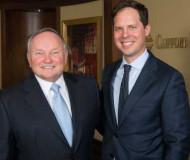9/13/2018
State Farm Pays $250 Million In Bribery ScandalLawsuit over defective repair parts and bribing a state supreme court justice settles for a quarter billion dollars.

State Farm Mutual Automobile Insurance Company last week agreed to pay $250 million to settle a lawsuit over substandard vehicle repairs and racketeering. The nationwide class action was filed in Illinois over twenty years ago, but a $1 billion jury verdict against the company was thrown out by the Illinois Supreme Court in 2005. What revived the suit was the undue influence that State Farm exerted over that decision by secretly funding a justice's campaign.
Lloyd A. Karmeier was elected to the high court in 2004, and now serves as chief justice. He joined while the rest of the court was deadlocked over Avery v. State Farm, and the lawsuit's proponents say his vote proved decisive in State Farm's favor. According to the testimony of forensic accountant Thomas A. Myers, State Farm funneled over $3.5 million to Justice Karmeier's campaign, more than three-quarters of the cash raised for his run.
The plaintiffs alleged that State Farm laundered the money and organizational effort through front groups like the Illinois Civil Justice League, which had former State Farm CEO Edward B. Rust Jr and current State Farm lobbyist William G. Shepherd on its executive committee.
Records confirm the close contact between State Farm and the Illinois Civil Justice League, which exchanged a total of 244 phone calls during the campaign. The league hand-picked Karmeier to run for an open seat on the court, raised the money and ran the campaign. To keep from having Justice Karmier recused from the Avery case, State Farm emphatically denied it had anything to do with the justice's election. A federal judge found the allegation that State Farm engaged in racketeering to influence the state Supreme Court decision was credible.
"Here, the court finds that plaintiffs have advanced evidence in support of its allegations to establish causation," US District Judge David R. Herndon ruled. "A reasonable jury could find that had State Farm's involvement been revealed, Justice Karmeier's impartiality could have been reasonably questioned and he could not have participated in the Avery decision and plaintiffs would not have suffered the injury or the damages. In addition, a reasonable jury could find that defendants' alleged fraudulent conduct tainted the Avery proceedings/decision."
Rather than continue the proceedings by having a jury sort out the facts, State Farm agreed to settle without admitting wrongdoing. The company will pay $250 million to those customers who had their cars repaired with non-OEM parts between 1987 and 1998. The payment amount will vary in relation to the cost of the parts and will be made after the legal fees incurred by attorneys Robert A. Clifford and Kristofer S. Riddle are covered.
The insurance industry as a whole has used similar tactics to promote the use of red light cameras and speed cameras through a number of front organizations.


